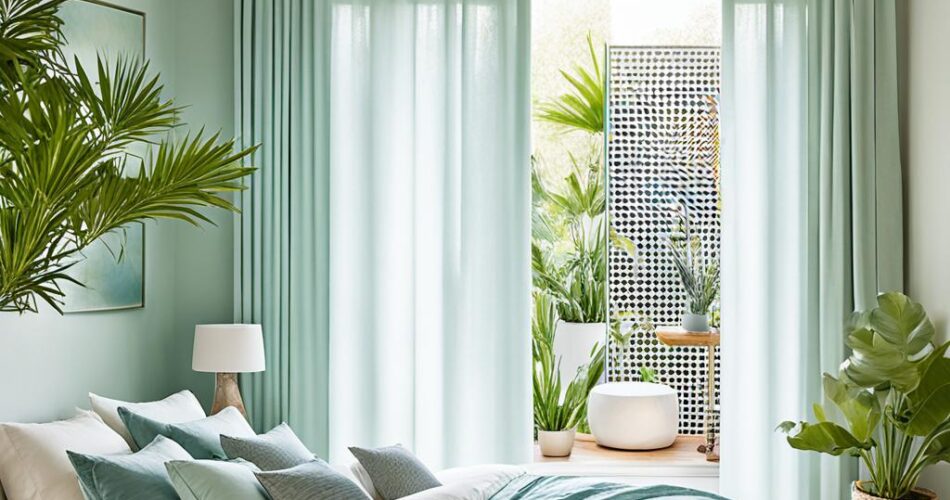Design your feng shui bedroom to cultivate harmony and tranquility. Arrange your bedroom layout strategically to harness natural energy flow. Foster peace through thoughtful decluttering and elemental balance.
Embrace feng shui principles for optimal bed placement, color schemes, and using plants and decor. Align with auspicious directions for positive chi energy flow. Tap into color psychology and decluttering tips for harmony.
Drawing from this chinese philosophy, curate a clutter-free space. Nurture well-being with a balanced environment. Align bedroom colors and furniture placement for free chi flow. Follow feng shui tips for a nurturing bedroom layout.
These feng shui principles help create a tranquil bedroom. Proper bed placement, color schemes, and decluttering optimize energy. Embrace yin and yang balance for elemental harmony. Curate a clutter-free space for relaxation.
Incorporate feng shui tips to align your design with ancient wisdom. Nurture mind, body, and soul with a harmonious bedroom layout.
Key Takeaways
- Feng shui principles help create a harmonious and tranquil bedroom environment.
- Proper bed placement, color schemes, and decluttering are essential for optimal energy flow.
- Embrace the concepts of yin and yang balance and elemental harmony.
- Curate a clutter-free space to promote relaxation and restful sleep.
- Incorporate feng shui tips to align your bedroom design with the ancient Chinese philosophy.
The Importance of Feng Shui in the Bedroom
Feng shui originates from ancient Chinese philosophy. It aims to create harmonious spaces by arranging objects based on energy flow principles. In feng shui, the bedroom is the most crucial room, as people spend significant time resting and recharging there.
Feng shui practitioners believe simple adjustments like proper bed positioning and eliminating clutter can positively impact comfort, health, and relationships. Following feng shui principles in the bedroom creates a harmonious ambiance, promoting relaxation, good health, and overall well-being.
Understanding the Principles of Feng Shui
Feng shui highlights the bedroom’s significance for creating a harmonious space that improves well-being and relationships. Practitioners believe arranging objects like auspicious layouts and bed positions can positively impact comfort, health, and relationships through simple adjustments.
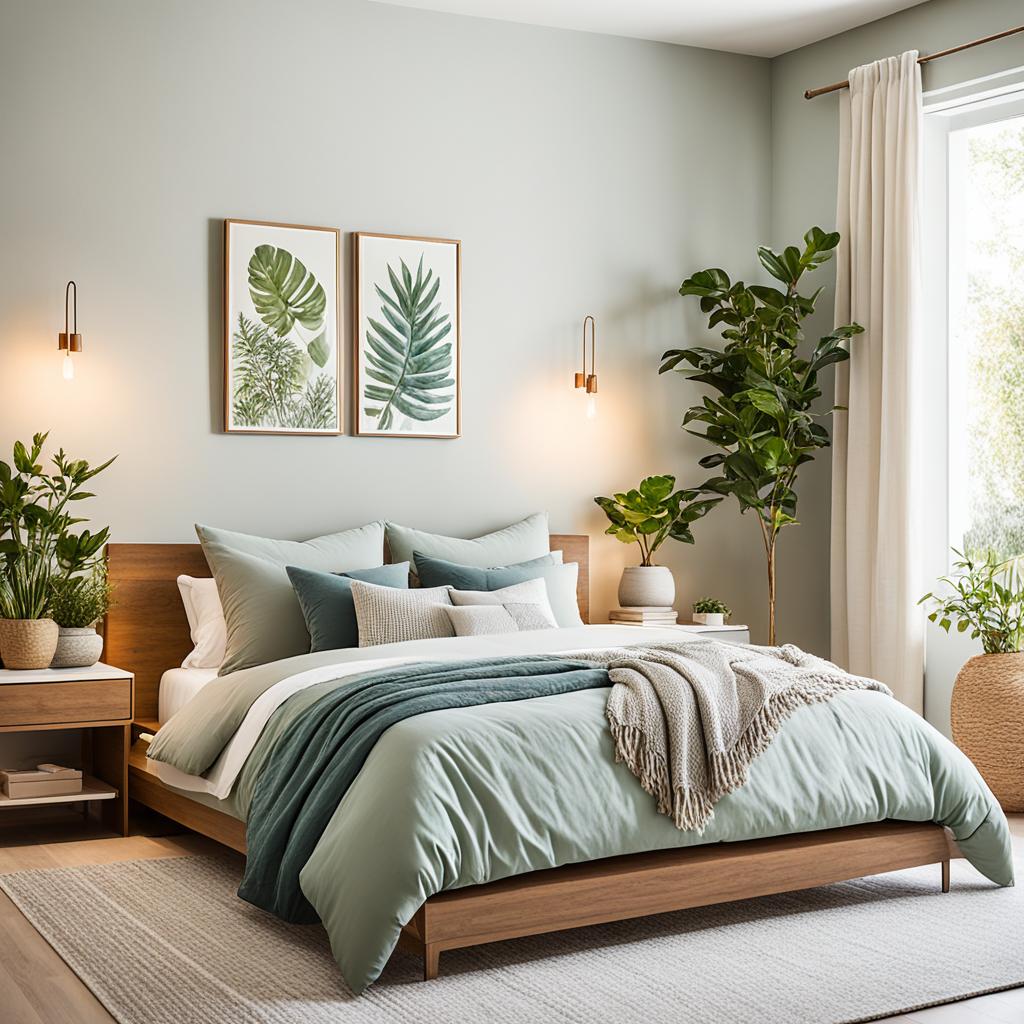
Feng shui guidance suggests positioning the bed in a commanding position, avoiding the “coffin position” where feet point out the door, and placing the headboard against a solid wall. Clearing space under the bed allows energy flow, while removing electronics and using symmetrical nightstands promote balanced energy.
Choosing neutral, non-stimulating colors promotes relaxation. Incorporating pinks and reds, associated with partnership energy, can enhance the romantic aspect. Avoiding exercise equipment, work materials, and water features helps maintain a restful and harmonious feng shui environment.
Regularly clearing space and using practices like smudging or essential oil diffusion uplifts the bedroom’s feng shui and energy. Ensuring proper bed size for chi energy circulation and avoiding overwhelming the space with too many plants are additional considerations for maintaining feng shui balance.
Bed Positioning and the Commanding Position
One fundamental feng shui principle in the bedroom involves bed positioning. The “commanding position” aims to promote security, control, and positive energy flow for restful sleep.
The bed should be placed diagonally from the entrance door. This allows you to see the door while lying in bed, but not directly aligned. Feng shui experts believe this placement creates a sense of command over the space.
Diagonal from the Door
The commanding position dictates the bed is diagonal from the door. You can survey the room without feeling vulnerable. This feng shui bed placement promotes a sense of command.
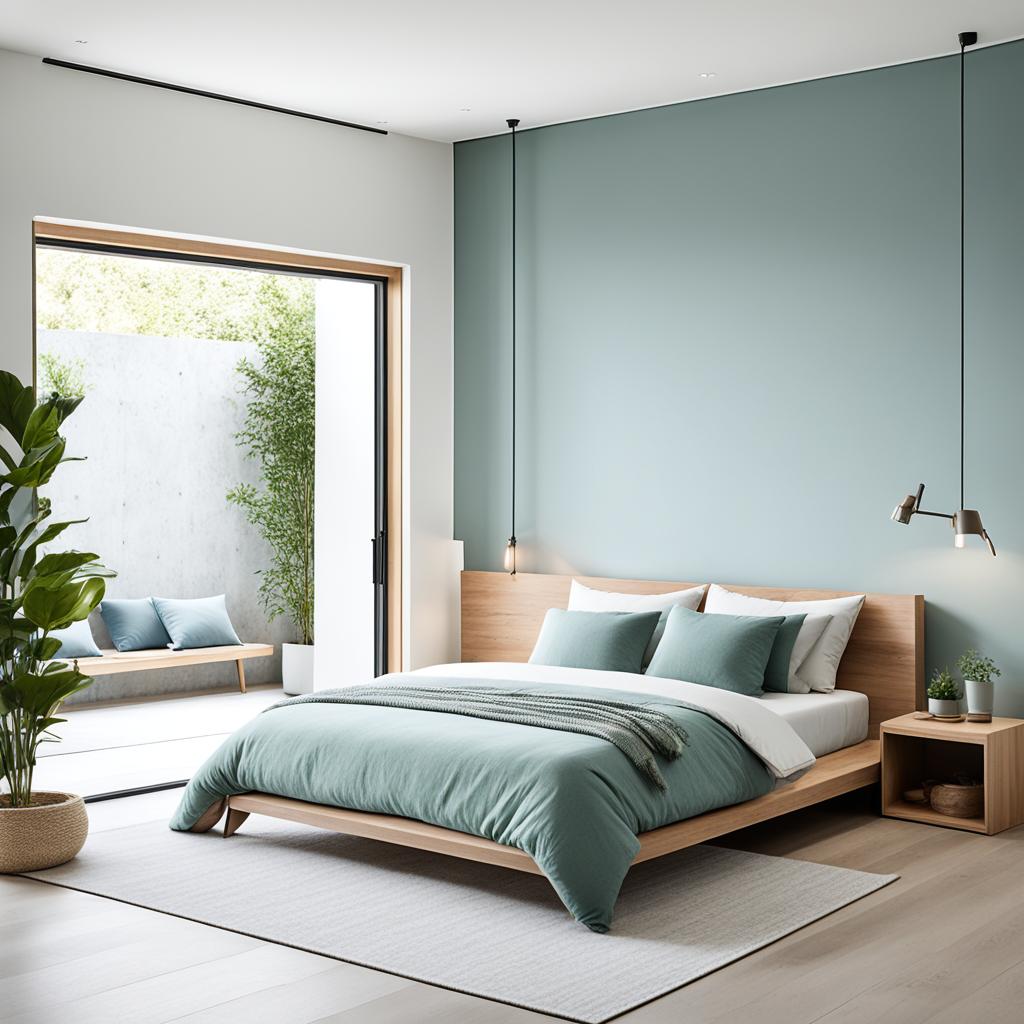
Using Mirrors for Visibility
If ideal positioning is unachievable due to layout constraints, strategically placed mirrors can help. Reflecting the door view allows maintaining the commanding position principle when the bed can’t be diagonal from the entrance.
Reiko Gomez and Anjie Cho emphasize proper feng shui bed placement is crucial for quality sleep and health. Following principles like the commanding position, where one sees the door while lying down, positively impacts life opportunities.
Moreover, minimizing feng shui bedroom clutter, especially under the bed, allows positive energy (qi) flow. Clear pathways and functional furniture arrangements contribute to a harmonious, rejuvenating bedroom environment.
Decluttering and Minimalism
In feng shui bedroom practice, decluttering and embracing minimalism create a calming space and achieve yin yang balance. Clutter obstructs positive energy flow, leading to chaos and restlessness. By adopting a “less is more” approach, the bedroom transforms into a serene sanctuary promoting relaxation and restful sleep.
Feng Shui principles suggest that excess possessions can block the flow of chi (energy) within a home. Chi represents opportunities, luck, financial abundance, and positive energy flow within a space.
The key to a clutter-free, balanced bedroom is keeping essentials like a comfortable bed, linens, a headboard, and a grounding rug. Electronics, unnecessary belongings, and items not sparking joy should be eliminated to create a harmonious bedroom environment.

For bedroom plant and mirror placement, choose wisely to enhance chi flow and create balance. Incorporate natural plants and strategically placed mirrors. However, avoid artificial plants, as they create stagnant energy and disrupt the harmonious ambiance.
| Feng Shui Principles | Benefits |
|---|---|
| Decluttering | Promotes free-flowing energy, reduces stress, and creates a sense of tranquility. |
| Minimalism | Aligns the space with personal growth, simplicity, and mindfulness. |
| Bedroom layout feng shui | Optimizes the arrangement of furniture and belongings for optimal energy flow. |
| Feng shui for better sleep | Enhances the quality of sleep by creating a peaceful, harmonious environment. |
Embracing decluttering and minimalism in the bedroom creates a space promoting feng shui sleep, inviting positive energy, balance, and overall well-being.
feng shui bedroom
In feng shui, the bedroom is the most sacred space. Its arrangement promotes energy flow and bedroom chi balance. The bed’s positioning impacts rest quality and well-being.
Bed Orientation and Headboard Principles
Feng shui recommends positioning the bed’s headboard against a solid wall. Avoid placement under windows or slanted ceilings. The ideal bed placement is with the head pointing south. When facing the door, use a mirror to reflect the entrance.
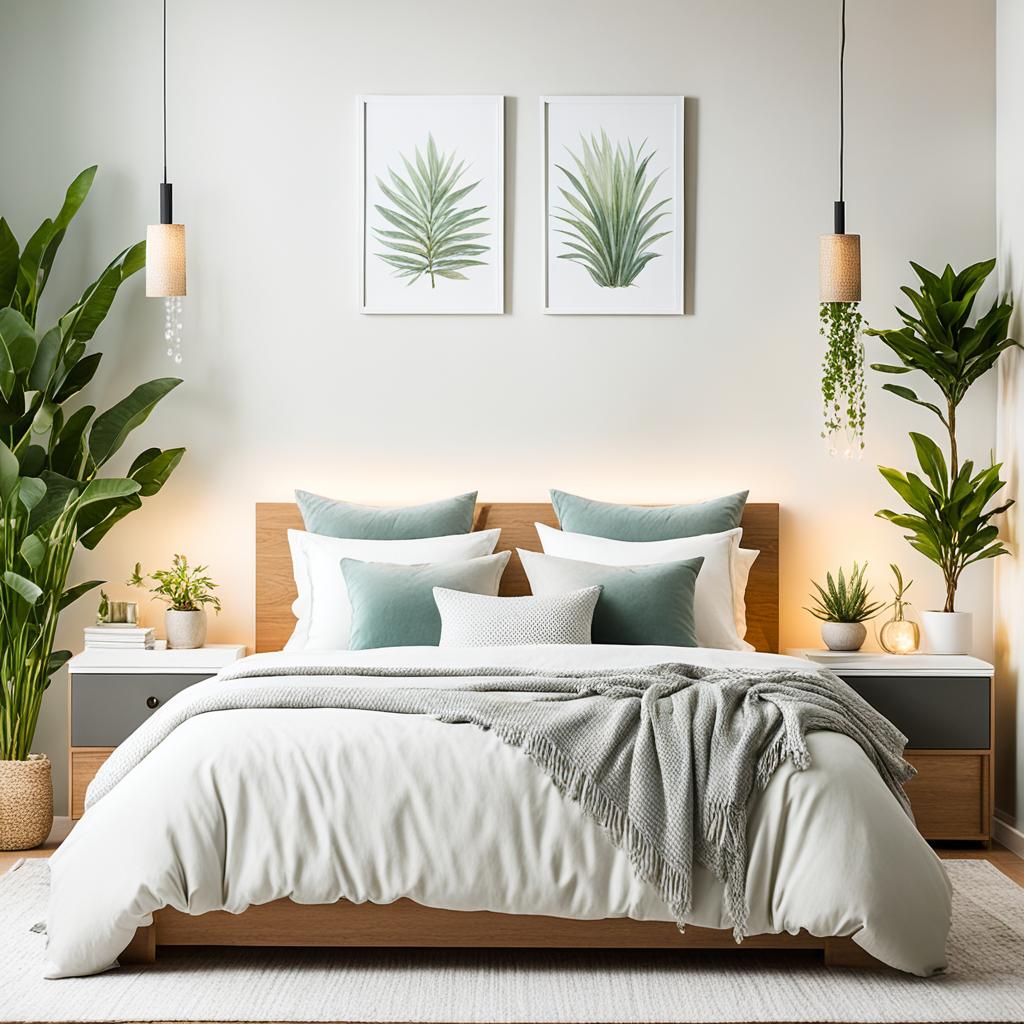
Clearing Underneath the Bed
Keep the area under the bed clear of obstructions. Clutter impedes the free flow of energy or chi. Fresh linens or uplifting books are acceptable, but maintain an uncluttered space underneath for harmonious energy.
Incorporate neutral shades, cool blues, and earthy tones for a calming atmosphere. Strategically place nightstands, lamps, and artwork to enhance the harmonious ambiance.
| Feng Shui Bedroom Principles | Recommended Practices |
|---|---|
| Bed Positioning | Headboard against solid wall, diagonal from door |
| Bed Orientation | Head towards south (if possible) |
| Under-Bed Area | Clear of clutter, allow energy flow |
| Color Scheme | Neutral, cool, and earthy tones |
| Bedroom Elements | Nightstands, lamps, artwork for harmony |
Following these feng shui principles creates a relaxing bedroom that promotes restful sleep and well-being, aligning with the ancient philosophy of harmonious living.
Electronics and Energy Fields
In our modern world, we’re constantly surrounded by electronic devices emitting electromagnetic fields (EMFs). While these technologies are indispensable, feng shui interior design recommends minimizing EMF exposure in bedrooms. This creates a serene atmosphere and peaceful environment for optimal sleep and rejuvenation.
Removing Televisions and Computers
One recommendation is removing televisions, computers, and other electronics from bedrooms. These devices contribute to visual clutter and emit EMFs disrupting natural rhythms, impairing sleep quality. Creating a technology-free zone cultivates a harmonious environment promoting deep relaxation.
Limiting Phone Usage
Feng shui colors and principles encourage limiting phone usage in bedrooms. Smartphones, while convenient, emit EMFs and constant stimulation, preventing the mind from unwinding. Instead, consider a minimalistic decor approach, incorporating soft lighting, natural materials, and calming elements for a tranquil oasis.
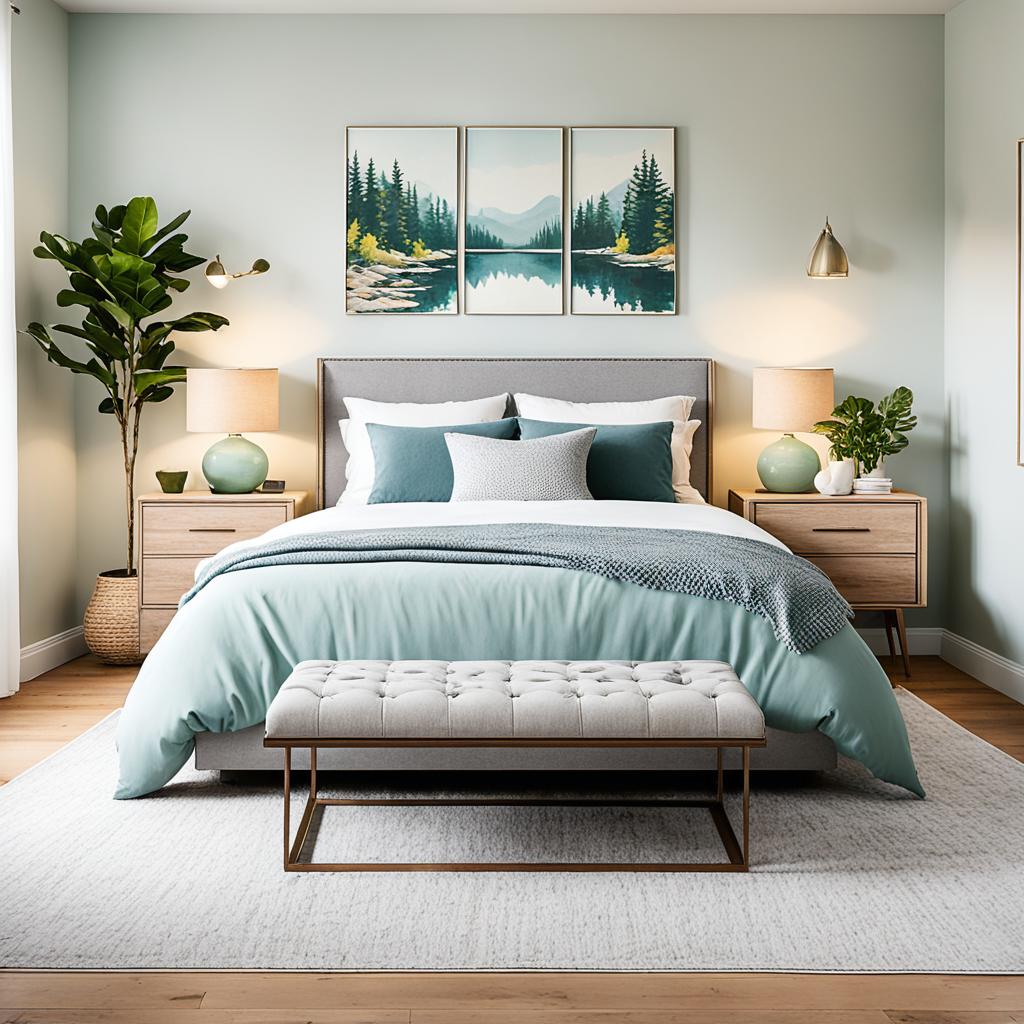
Removing or minimizing electronic devices in bedrooms reduces EMF exposure, creating a space promoting deep relaxation and rejuvenation. This aligns with the zen bedroom concept, fostering a harmonious environment for better sleep and well-being.
Incorporating indoor plants can add natural beauty and contribute to air purification, further enhancing tranquility in your personal sanctuary.
| EMF Source | Potential Effects | Mitigation Strategies |
|---|---|---|
| Electronics (TVs, computers, phones) | Disrupted sleep, fatigue, headaches | Remove from bedroom, distance from devices |
| Wireless devices | Nervousness, reduced concentration | Use wired connections, take breaks |
| Electrical wiring | Potential long-term health risks | Insulate wiring, use shielded wire looms |
Symmetry and Balance
In feng shui, creating harmony and balance in the bedroom promotes positive energy and good vibes. Achieving symmetry through thoughtful furniture arrangement and design is crucial. This contributes to a harmonious ambiance.
Nightstands and Table Lamps
A fundamental feng shui remedy is incorporating two nightstands, one on each side. The Spruce recommends this setup for establishing balance. The nightstands needn’t be identical but should complement each other in style and size.
Adorning each nightstand with a table lamp adds illumination and enhances symmetry. The warm glow cultivates a calming atmosphere, promoting better sleep quality and well-being.

Creating Equal Space
Feng shui principles advocate for equal space on both sides of the bed. This balanced approach symbolizes equal representation of both partners, fostering harmony and unity. Ensuring ample and symmetrical space allows unobstructed and harmonious energy flow.
Adhering to symmetry and balance transforms your bedroom into a tranquil sanctuary. From nightstand placement to overall organization, embracing these practices cultivates harmony, rejuvenating rest, and a calm mindset.
| Feng Shui Element | Bedroom Benefit |
|---|---|
| Symmetrical Nightstands | Promotes balance and harmony |
| Matching Table Lamps | Creates a calming ambiance for better sleep |
| Equal Space on Both Sides | Fosters unity and partnership energy |
Embracing these timeless principles transforms your bedroom into a sanctuary radiating calm colors, balanced energy, and harmonious vibes. This sets the stage for restful nights and rejuvenating mornings.
Color Choices and Imagery
The right colors and visuals can create a relaxing ambiance for restful sleep.
Promoting a sense of calm and yin and yang balance in the bedroom.
Neutral and Cool Tones
Neutral hues like beiges, creams, earthy tones promote a sense of calm.
Cool colors like soft blues, pale greens lend tranquility to your personal sanctuary.
For feng shui artwork, choose pieces evoking harmony and balance in the bedroom.
Images of couples encourage partnership energy.
Avoid single people or object depictions if seeking a romantic relationship.
Artwork and Photos
Hang artwork opposite the feng shui bed position for positive energy flow.
Avoid mirrors opposite, next to, or over the bed for peaceful night’s sleep.
Curate colors, artwork for a harmonious, clutter-free bedroom inviting natural elements.
| Color | Feng Shui Meaning | Recommended Bedroom Use |
|---|---|---|
| Warm Earth Tones | Cozy, welcoming atmosphere | Main color scheme |
| Soft Blues, Greens, Lavenders | Tranquility, healing energy | Accent colors |
| Bright Reds, Pinks | Romance, passion | Accent colors, limited use |
Incorporate these feng shui principles for a serene, rejuvenating bedroom oasis.
Furniture and Belongings
Creating a peaceful sleep environment requires careful consideration of furniture and belongings. Certain items can disrupt the harmonious energy flow essential for restful slumber.
Towering bookshelves introduce active energy that stimulates the mind, making it challenging to unwind. The presence of numerous books subconsciously encourages intellectual engagement, conflicting with the desired relaxing sanctuary.
Workout Gear and “Yang” Energy
Exercise equipment and workout gear represent an active and energetic force, known as “yang” energy. While beneficial in moderation, an abundance can disrupt the tranquil bedroom ambiance.
To maintain a harmonious environment, store workout gear in a designated area outside the bedroom.
Office Separation
If a home office setup is necessary within the bedroom, establish a clear separation between the two zones. Strategically placed screens or curtains create a physical and energetic barrier.
This ensures the harmonious interior design of the sleep sanctuary is not compromised by the active energy associated with work.
| Furniture/Belongings | Energy Impact | Feng Shui Recommendation |
|---|---|---|
| Bookshelves | Active, stimulating energy | Limit or relocate outside the bedroom |
| Workout Equipment | “Yang” energy, disruptive to relaxation | Store in a designated exercise area |
| Home Office | Active, work-related energy | Create a clear separation using screens or curtains |
By mindfully curating bedroom furniture and belongings, individuals can cultivate a tranquil oasis promoting deep relaxation. Adhering to these feng shui guidelines contributes to a balanced atmosphere optimized for restful sleep.
Conclusion
Transforming your bedroom into a tranquil sanctuary is achievable by incorporating feng shui principles. Following optimal bed placement, decluttering, balanced color schemes, and using natural elements can create a relaxing space.
Promoting restful sleep and well-being, maintaining yin-yang balance and applying bagua map principles enhances positive chi flow and energy.
A key aspect is selecting soothing bedroom color schemes that foster calmness. Soft muted tones like light blues, greens, and grays are ideal. Incorporating natural materials like cotton, silk, or linen contributes to harmony.
While adhering to feng shui tips requires adjustments, the benefits of improved energy flow, positive chi, and serenity make it worthwhile. Strategically arranging furniture, eliminating clutter, and embracing natural light and harmonious colors transforms bedrooms into rejuvenating sanctuaries.
